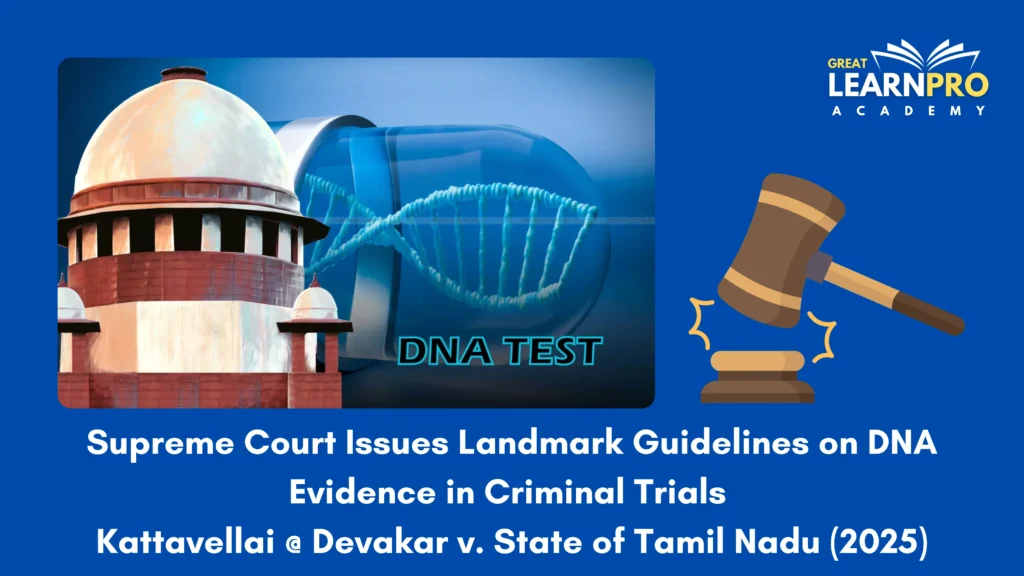The Supreme Court of India in Kattavellai @ Devakar v. State of Tamil Nadu (2025) delivered a landmark judgment that lays down binding guidelines for the collection, preservation, and admissibility of DNA evidence in criminal cases. Recognising both the power and risks of forensic science, the Court underscored that DNA evidence can be a critical tool for justice, but only when handled with scientific rigour and constitutional safeguards.

Facts of the Case
- The appeal stemmed from a criminal conviction in which DNA evidence was central to linking the accused (Kattavellai @ Devakar) to the alleged offence.
- The defence questioned the credibility of the DNA sample, pointing to:
- Delays in sending it to the Forensic Science Laboratory (FSL).
- Extended custody of the sample with police, raising the possibility of tampering or contamination.
- The accused argued that improper procedures during collection, preservation, and transportation undermined the sample’s reliability.
- The matter reached the Supreme Court, where the admissibility and probative value of DNA evidence became the central question.
Issues Before the Court
- Can DNA evidence, if not collected and preserved properly, be treated as reliable in criminal trials?
- What safeguards are necessary to ensure the authenticity and integrity of DNA samples?
- Should DNA evidence be treated as conclusive proof or merely as opinion evidence under Section 39 of the Bharatiya Sakshya Adhiniyam, 2023?
- How should courts balance the probative value of DNA evidence with constitutional protections such as Article 20(3) (protection against self-incrimination) and Article 21 (right to privacy and fair trial)?
- Is there a need for uniform national guidelines to standardise DNA collection and handling across India?
Key Guidelines Laid Down by the Court
To address these issues, the Court prescribed a comprehensive framework:
- Collection Stage
- Every DNA sample must be accompanied by clear documentation: FIR number, investigating officer’s name and rank, signatures of the medical professional who collects it, and signatures of independent witnesses.
- Once sealed, a DNA sample cannot be reopened or resealed without permission of the trial court.
- Transportation
- Samples must be transported to the FSL within 48 hours of collection. Any delay must be explained and justified before the trial court.
- Chain of Custody
- A Chain of Custody Register is mandatory, recording each transfer of the sample — by whom, to whom, when, and where.
- This register must be part of the court record, ensuring transparency.
Issues in DNA Evidence Management Recognised by the Court
The judgment highlighted the following recurring concerns:
- Contamination and degradation due to poor storage or environmental exposure.
- Quantity problems, where insufficient sample prevents reliable testing or retesting.
- Analysis errors, including human error, lack of uniform lab protocols, or unconscious bias.
- Interpretation challenges in cases of trace DNA, mixed DNA (from multiple persons), or low-quality samples.
- Privacy risks, since DNA contains sensitive personal and genetic information.
Judicial Approach to Admissibility
- The Court clarified that DNA evidence is opinion evidence under Section 39 of the Bharatiya Sakshya Adhiniyam, 2023. It is not automatically conclusive, but its probative value depends on compliance with scientific and procedural standards.
- Past cases informed this position:
- Sharda v. Dharmpal (2003) held DNA testing permissible in matrimonial disputes, not violating Article 20(3) or Article 21.
- Rahul v. State of Delhi, MHA (2022) rejected DNA evidence because samples stayed in police custody for two months, creating scope for tampering.
Significance of the Guidelines
- Preventing Miscarriages of Justice
- Wrongful convictions based on mishandled DNA evidence are a global problem. The guidelines aim to ensure only credible DNA evidence is used.
- Strengthening Fair Trial Guarantees
- Accused persons will now have a stronger basis to challenge questionable DNA evidence if custody rules or timelines were violated.
- Scientific Rigor
- Investigating officers, doctors, and forensic labs must adhere to strict protocols, improving the overall credibility of forensic science in India.
- Balancing Rights and Technology
- The Court acknowledged the value of DNA evidence but emphasised it must not override privacy, liberty, and fair trial rights.
Challenges Ahead
- Infrastructure gaps: Many FSLs in India face backlog, poor facilities, and lack of trained personnel.
- Training needs: Police, doctors, and lab technicians require new skills and knowledge to comply with the guidelines.
- Costs and logistics: Quick transport (within 48 hours) and secure storage may be difficult in rural or remote areas.
- Judicial enforcement: Trial courts must actively monitor compliance, which may lengthen proceedings but will ensure fairness.
- Data protection: Safeguards against misuse of DNA databases are essential to prevent privacy violations or genetic discrimination.
Conclusion
The Supreme Court’s judgment in Kattavellai @ Devakar marks a decisive step in shaping the role of forensic science within Indian criminal justice. By laying down strict protocols for collection, preservation, chain of custody, and admissibility, the Court has sought to strike a careful balance between scientific progress and constitutional protections.
While implementation challenges remain — from forensic capacity to training and infrastructure these guidelines provide a much-needed framework to reduce errors, protect rights, and enhance trust in criminal trials. Going forward, their consistent application could help India move toward a more reliable and rights-oriented system of forensic justice.
Sources:
- https://www.google.com/amp/s/www.livelaw.in/amp/supreme-court/2025-livelaw-sc-703-kattavellai-devakar-versus-state-of-tamilnadu-297660
- https://www.google.com/amp/s/www.verdictum.in/amp/court-updates/supreme-court/kattavellai-devakar-v-state-of-tamil-nadu-2025-insc-845-dna-evidence-cases-directions-issued-1585029
More Current affairs: https://learnproacademy.in/updates/
